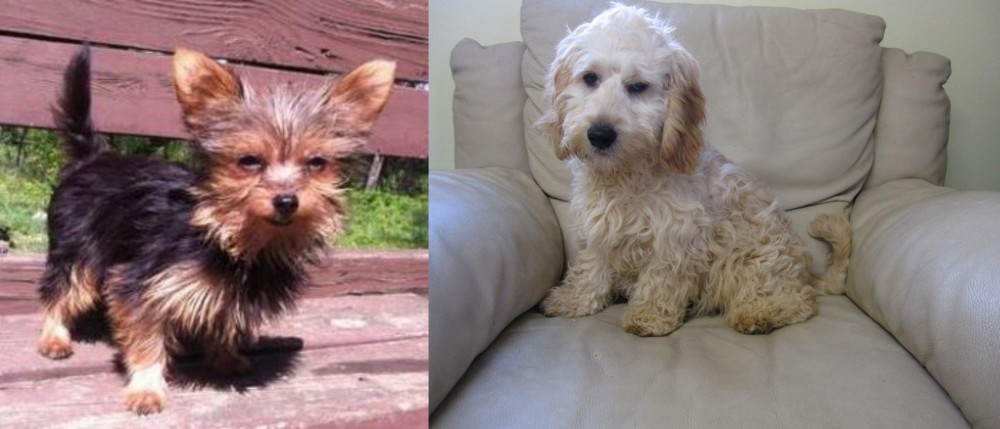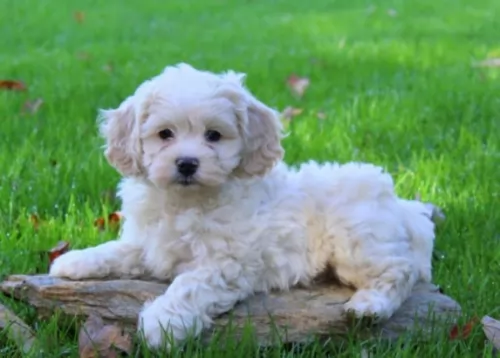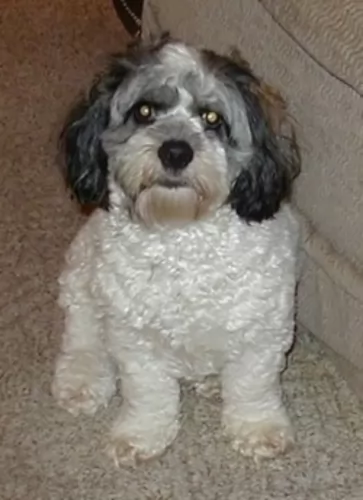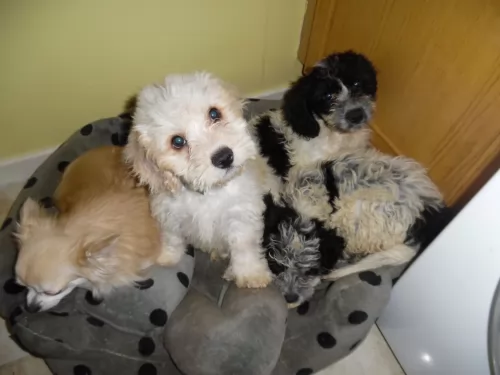 Petzlover
Petzlover Both Chorkie and Cockachon are originated from United States. Chorkie may grow 30 cm / 11 inches shorter than Cockachon. Both Chorkie and Cockachon are of same weight. Chorkie may live 3 years less than Cockachon. Both Chorkie and Cockachon has almost same litter size. Both Chorkie and Cockachon requires Low Maintenance.
Both Chorkie and Cockachon are originated from United States. Chorkie may grow 30 cm / 11 inches shorter than Cockachon. Both Chorkie and Cockachon are of same weight. Chorkie may live 3 years less than Cockachon. Both Chorkie and Cockachon has almost same litter size. Both Chorkie and Cockachon requires Low Maintenance.
 The Chorkie is a very popular little dog but he is not a purebred. The Chorkie was developed by crossing the Yorkshire Terrier with the Chihuahua. Probably the most popular Chorkie ever was the Taco Bell dog in the 1990s. This hybrid is a young breed created in the late 1900’s. These small, toy dogs are great lapdogs. It’s not possible to know the exact heritage of the Chorkies but the initial crossing of the two breeds occurred in the early part of the 20th century.
The Chorkie is a very popular little dog but he is not a purebred. The Chorkie was developed by crossing the Yorkshire Terrier with the Chihuahua. Probably the most popular Chorkie ever was the Taco Bell dog in the 1990s. This hybrid is a young breed created in the late 1900’s. These small, toy dogs are great lapdogs. It’s not possible to know the exact heritage of the Chorkies but the initial crossing of the two breeds occurred in the early part of the 20th century.
The Chorkie makes a great indoor pet best suited for the single or elderly person. Not because the Chorkie does not like children but because they are so small they can be easily injured by children. They are continuing to grow in popularity all the time among those who enjoy the new designer dogs.
 The Cockachon is not a pure bred dog but rather a cross between the Cocker Spaniel and the Bichon Frise. Very little if anything is known about who initially developed the Cockachon. It is known that the International Designer Canine Association (IDCA)registered and recognized the hybrid in 2009.
The Cockachon is not a pure bred dog but rather a cross between the Cocker Spaniel and the Bichon Frise. Very little if anything is known about who initially developed the Cockachon. It is known that the International Designer Canine Association (IDCA)registered and recognized the hybrid in 2009.
It is obviously a relatively new cross breed. The hybrid is also recognized by the American Canine Hybrid Club (ACHC), International Designer Canine Registry (IDCR) and the Designer Dog Kennel Club (DDKC).
 As mentioned previously the Chorkie is a mix between the Yorkshire Terrier (Yorkie) and the Chihuahua. They Tend to look more like the terrier than the Chi with a small head carried high on a well-proportioned body, with the long silky hair of the Yorkie. Their head carried the shape of the Chihuahua. Like the Chihuahua, they have mostly pointed ears although some Chorkies have droopy ears. The Chorkie coat is silky, long, and can be in a variety of colors. The ears are either fringed like the Yorkie or smooth like the Chihuahua.
As mentioned previously the Chorkie is a mix between the Yorkshire Terrier (Yorkie) and the Chihuahua. They Tend to look more like the terrier than the Chi with a small head carried high on a well-proportioned body, with the long silky hair of the Yorkie. Their head carried the shape of the Chihuahua. Like the Chihuahua, they have mostly pointed ears although some Chorkies have droopy ears. The Chorkie coat is silky, long, and can be in a variety of colors. The ears are either fringed like the Yorkie or smooth like the Chihuahua.
 The Cockachon is a cute, little dog very popular in current times. He is small, compact, dark eyes, a round head and black nose. He has a baby face and fluffy hair. It has a furry tail and a blunt muzzle.
The Cockachon is a cute, little dog very popular in current times. He is small, compact, dark eyes, a round head and black nose. He has a baby face and fluffy hair. It has a furry tail and a blunt muzzle.
The Cockachon is a mix between the American Cocker Spaniel and the Bichon Frise. In order to get a better idea of what the hybrid can look like just look at the individual parents. The American Cocker Spaniel is a small dog with a short muzzle and domed head. It is in the Sporting Group, but it is the smallest member of the group. He has a compact, sturdy body and though domed his head is refined.
The Cocker’s stance includes a sloping topline, muscular hindquarters and strong shorter legs adds up to a balanced canine. The coat can be in a wide variety of colors including liver, golden, black, and red. Also, it could be liver and tan, black and tan, roan or tricolors. So, while the Bichon Frise is always white the Cockachon can be any of these colors including white. The types of coats that the Cocker Spaniel and the Bichon Frise have are very different as well.
The Bichon Frise is also a small dog, actually smaller than the American Cocker. The Cockachon usually ends up being about the size of the Bichon at 5-10 kg in weight and 23-30 cm in height. The skull of the Bichon Frise is round rather than domed and the muzzle is also rounded. The tail is long and curly while the Cocker would usually have a cropped tail. The nose and eyes of the Bichon Frise are black and its hair is dense and curly. Unlike the Cocker Spaniel it barely sheds.
Many Cockachon have floppy ears, curly coats and come in any variety of colors though many, many are white.
 Remember that the Chorkie is a cross breed and not a purebred. Its temperament is that of a mixed breed dog which is usually laid back and mellow. The Chorkie might bark a lot as both the Yorkshire and the Chihuahua are known to bark. It can carry the traits of either or both of its parents.
Remember that the Chorkie is a cross breed and not a purebred. Its temperament is that of a mixed breed dog which is usually laid back and mellow. The Chorkie might bark a lot as both the Yorkshire and the Chihuahua are known to bark. It can carry the traits of either or both of its parents.
The Chorkie is a great lap dog though he can be stubborn and wear their owner out with all their energy. They are playful and willful and need strong leadership despite their small size. They will bark at anything they find to be suspicious. Despite their size they are highly intelligent and very loyal, affectionate dogs. They love their people and will not like it if you leave them alone very often. They are quite brave to the point of being reckless and can be aggressive toward dogs a lot bigger than they are. Due to their courage and their barking they are great family dogs.
 People created the Cockachon to get a small, lap or carry dog that had certain characteristics. These characteristics included a very social, loving dog. He is active and friendly, sweet and gentle. He is loyal, and loves being loved. He is great with other dogs and you can trust him with your children. He is a little independent but very loyal.
People created the Cockachon to get a small, lap or carry dog that had certain characteristics. These characteristics included a very social, loving dog. He is active and friendly, sweet and gentle. He is loyal, and loves being loved. He is great with other dogs and you can trust him with your children. He is a little independent but very loyal.
Like many little dogs he can have serious separation anxiety. Crate training is recommended so that he has a place to feel safe when you are not with him.
 Hybrid dogs seldom have a lot of inherited diseases as they seem to jump a generation but if they do, it can be either a combination of both breeds issues or issues from just one of the breeds in the cross. For the Cockachon these issues include:
Hybrid dogs seldom have a lot of inherited diseases as they seem to jump a generation but if they do, it can be either a combination of both breeds issues or issues from just one of the breeds in the cross. For the Cockachon these issues include:
This loose kneecap issue is common to many small dogs and can cause lameness if not addressed.
Eyelid problems such as the ones that might bother a Cockachon can be found in many small dogs. These include Entropion and Ectropion.
 These small dogs have a lot of energy and need to eat a food that is high in quality calories. No empty calories for these guys. Feed them at least twice a day and no more than a fourth of a cup of dry food for the entire day. They can become overweight easily so do not overfeed.
These small dogs have a lot of energy and need to eat a food that is high in quality calories. No empty calories for these guys. Feed them at least twice a day and no more than a fourth of a cup of dry food for the entire day. They can become overweight easily so do not overfeed.
Additional health issues might include knee cap dislocation leading to arthritis or lameness and a tendency to develop low blood sugar.
Again, these are high energy little dogs. They need to be exercised or at least have brisk play inside the house. They excel at competitive games such as barn hunt, agility and obedience.
 Don’t overfeed a Cockachon. Give him ¾ -1.5 cups of dry food of high quality in two meals per day.
Don’t overfeed a Cockachon. Give him ¾ -1.5 cups of dry food of high quality in two meals per day.
In addition to the issues listed above, the Cockachon is also prone to heart disease and cardiac issues.
The Cockachon has a lot of energy for its size. Make sure it gets plenty of exercise. If walks are the exercise of your choice make sure you walk him for 30 minutes a day. He loves to play, and a back yard would be nice. These little guys do well in obedience but are usually to small for agility.